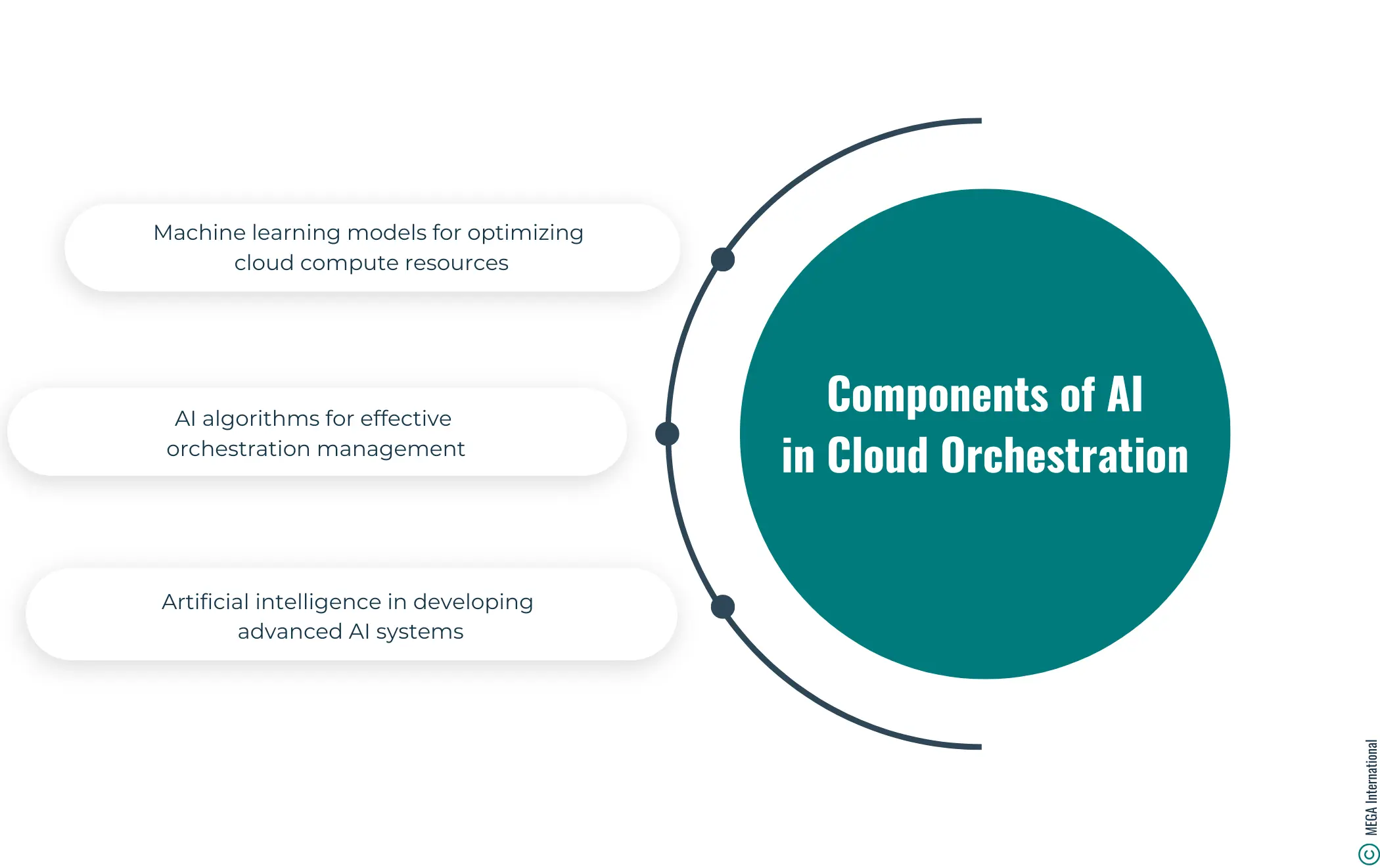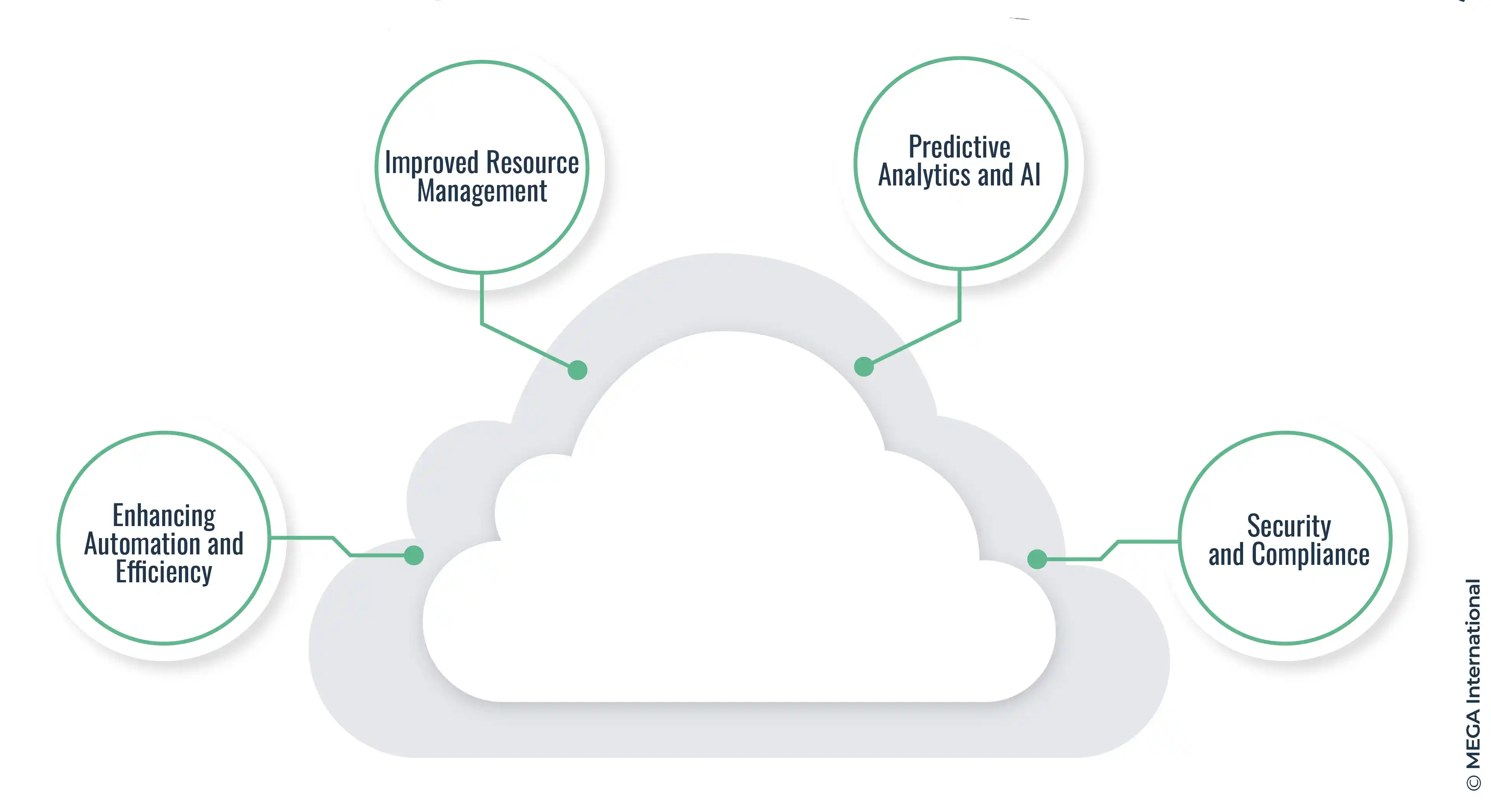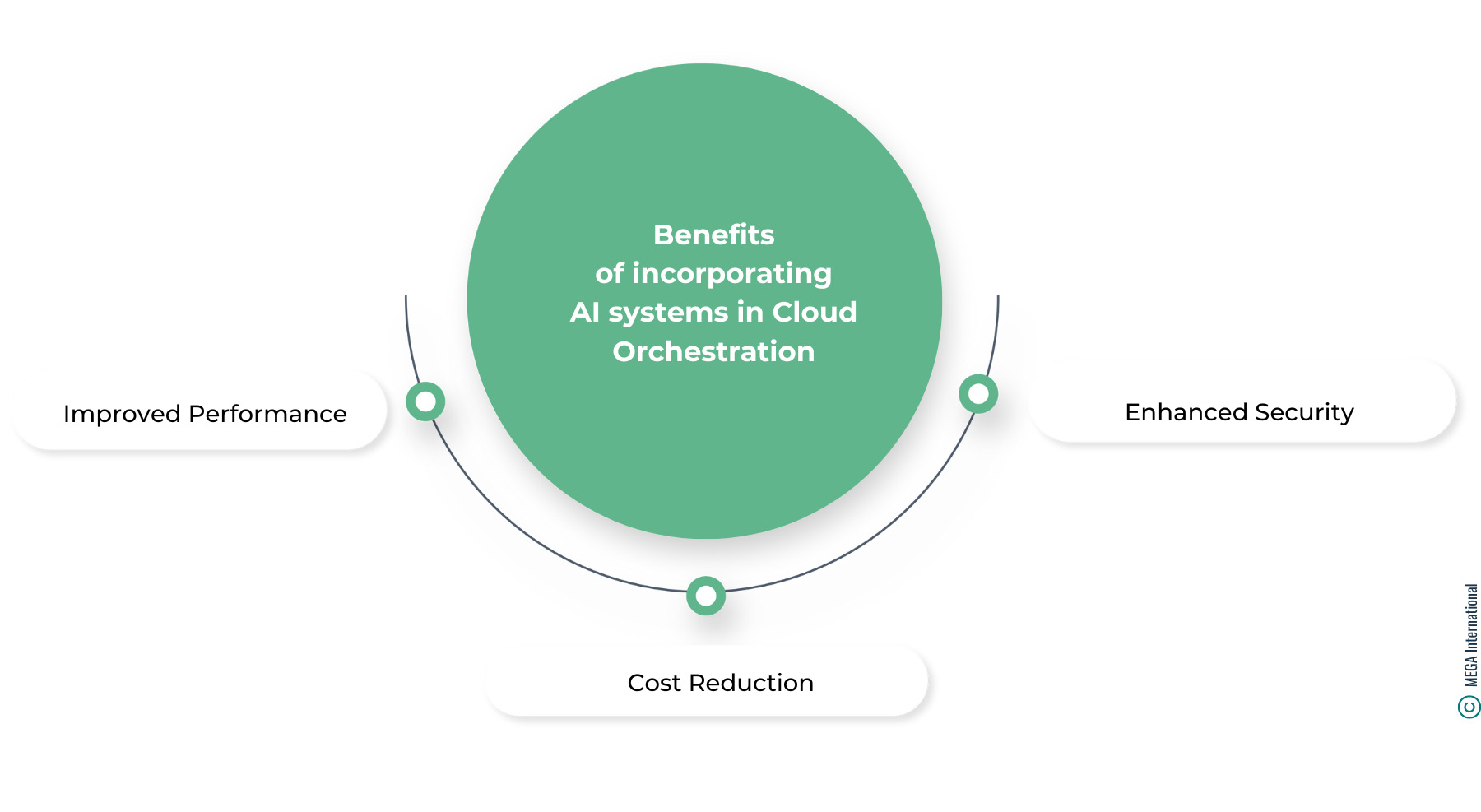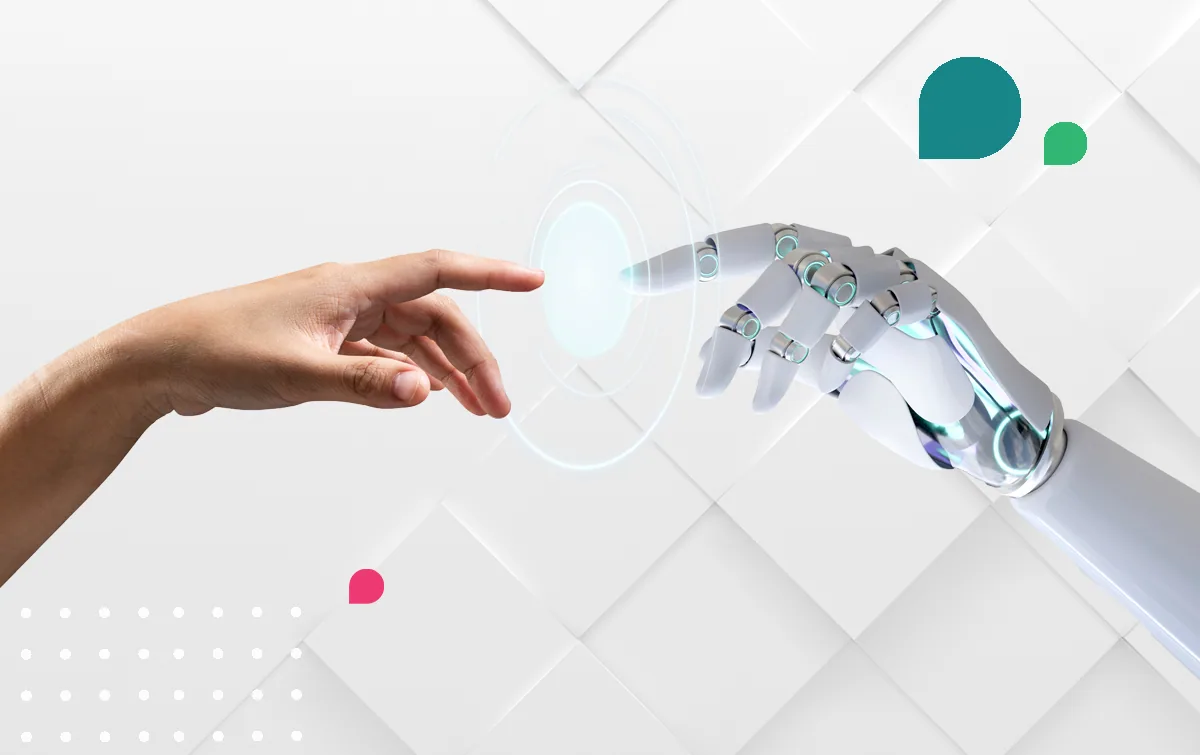
The Role of AI in Cloud Orchestration
Artificial Intelligence (AI) and cloud orchestration collectively represent a paradigm shift in how businesses deploy, manage, and scale their IT resources.
This synergy streamlines operations and uncaps new efficiency, security, and innovation potential. As we delve into the role of AI in cloud orchestration, it's essential to understand the complexities and the transformative potential it holds.
Let's delve deeper into each of these aspects.
What are the key components of AI in cloud orchestration?

Machine learning models for optimizing cloud compute resources: AI utilizes machine learning models to adjust resource allocation based on workload demands dynamically, maximizing efficiency.
Using AI algorithms for effective orchestration management: AI algorithms analyze data to make informed decisions on resource allocation, scheduling tasks, and managing cloud infrastructure.
The role of artificial intelligence in developing advanced AI systems: AI plays a pivotal role in the evolution of sophisticated AI systems that drive innovation and performance improvements in cloud orchestration.
The Role of AI in Cloud Orchestration
It becomes clear that the future of cloud computing is not just expanding its capacity or reach but making it more innovative, more responsive, and ultimately more aligned with the dynamic needs of businesses in the digital age.

Enhancing Automation and Efficiency
AI significantly enhances the automation capabilities within cloud orchestration, making it possible to automate complex workflows and processes that were previously manual or semi-automated. This speeds up operations and reduces the potential for human error, leading to a more efficient and reliable cloud environment.
For instance, AI algorithms can automatically scale resources up or down based on real-time demand, ensuring optimal performance without manual intervention.
Improved Resource Management
Resource management is another area where AI makes a substantial impact. Traditional cloud management requires administrators to predict resource needs and allocate them accordingly, often leading to underutilization or over-provisioning.
AI changes this dynamic by analyzing usage patterns and adjusting resources dynamically. This ensures that applications have the resources they need when needed, improving efficiency and reducing costs associated with idle resources.
Predictive Analytics and AI
Predictive analytics powered by AI is a game-changer for anticipating future demands, potential system failures, or bottlenecks before they occur.
AI algorithms can predict future outcomes and suggest proactive measures by analyzing historical data and identifying trends. This capability allows organizations to optimize operations, prevent downtime, and ensure a seamless user experience. Predictive analytics can also guide strategic decision-making processes, enabling businesses to plan for growth more accurately.
Security and Compliance
Security and compliance are paramount in the cloud, and AI significantly enhances an organization's ability to protect its data and adhere to regulatory standards.
AI-driven systems can continuously monitor cloud environments for unusual activity that may indicate a security breach, automatically initiating responses to mitigate threats.
Furthermore, AI can help enforce compliance policies by automatically applying and managing security configurations and controls across the cloud environment, ensuring that data protection standards are consistently met.
Real-world Applications of AI in Cloud Orchestration
Integrating Artificial Intelligence (AI) into cloud orchestration is not just theoretical but has been successfully implemented across various industries, showcasing the tangible benefits of this technology. Let's explore some real-world applications and success stories.
Challenges and Considerations
While integrating AI into cloud orchestration offers numerous advantages, it also presents specific challenges and considerations that organizations must navigate.
Integration Challenges
Integrating AI into existing cloud infrastructure can be complex, particularly for organizations with legacy systems or those that rely heavily on manual processes.
Compatibility issues between different technologies and the need for significant upfront investment in time and resources can pose hurdles.
A learning curve is also associated with adopting new AI tools and training staff to effectively manage and utilize these systems.
The Complexity of AI Algorithms
Developing and implementing AI algorithms suitable for cloud orchestration requires high expertise. These algorithms must be precisely tailored to the specific needs and dynamics of the organization's cloud environment. Moreover, AI systems must be continuously trained and refined to adapt to changing conditions and improve accuracy.
This complexity necessitates a dedicated team of AI specialists who can develop, deploy, and maintain these algorithms, adding another layer of operational consideration for an organization.
How can AI models be applied to enhance cloud orchestration?
Implementing machine learning models for intelligent workload allocation: AI models intelligently distribute workloads across cloud infrastructure to optimize performance and minimize latency.
Leveraging AI for dynamic scaling and resource allocation in cloud environments: AI enables automatic scaling of resources based on demand fluctuations, ensuring optimal performance and cost-effectiveness.
Enhancing orchestration efficiency through AI-based decision-making: AI-driven decision-making processes enhance orchestration efficiency by predicting future resource needs and proactively adjusting deployment strategies.
What are the benefits of incorporating AI systems in cloud orchestration?

Improving overall performance with AI-driven optimization strategies: AI optimization strategies enhance the performance of cloud services, leading to faster processing times and improved user experience.
Reducing operational costs through AI-enabled resource management: AI efficiently allocates resources, reduces wastage, and automates processes, resulting in cost savings for organizations utilizing cloud services.
Enhancing security measures with AI-based threat detection in cloud platforms: AI systems improve security by detecting and responding to potential threats in real time, safeguarding sensitive data, and ensuring compliance with regulatory requirements.
READ: Cloud Orchestration Definition
The Future of AI in Cloud Orchestration
As we look to the future, it's clear that Artificial Intelligence (AI) will continue to play a pivotal role in the evolution of cloud orchestration. The landscape is ripe for innovation, with emerging trends and potential developments promising to further revolutionize how businesses manage their cloud environments.
Emerging Trends
One of the most notable trends is the increasing adoption of AI for edge computing in cloud orchestration. This involves deploying AI algorithms closer to where data is generated, reducing latency, and enabling real-time data processing and decision-making. This trend is particularly relevant for IoT applications and services that require rapid responses, such as autonomous vehicles and smart cities.
READ: Disruptive Technology Trends Impacting Enterprise Architecture
Another emerging trend is the use of AI for more sophisticated workload optimization. AI algorithms are becoming capable of scaling resources up or down based on demand and predicting future workload patterns. This allows for preemptive resource allocation, ensuring that resources are optimally distributed even before they are needed.
Potential Developments
We can anticipate several exciting developments in AI and cloud orchestration. One potential area of advancement is integrating AI with serverless computing models.
AI could automate the deployment of serverless functions, optimizing resource usage and performance while reducing costs. This would allow businesses to focus on their core offerings rather than managing server resources.
Another promising development is the enhancement of security protocols through AI-driven threat detection and response systems.
As cyber threats become more sophisticated, AI can provide a dynamic defense mechanism, continuously learning from new threats and adapting its response strategies accordingly. This would significantly enhance the security posture of cloud-based environments.
Summary
Integrating AI into cloud orchestration marks a significant leap forward in how businesses manage and leverage their IT resources. By harnessing the power of AI, companies can achieve unparalleled efficiency, security, and agility in their cloud operations as we continue to explore the potential of this integration.
FAQs
AI enhances cloud orchestration by introducing intelligent automation, predictive analytics, and sophisticated resource management capabilities. It enables more efficient operations, optimized resource use, and improved security and compliance.
Challenges include the complexity of AI algorithms, the need for seamless integration with existing cloud infrastructures, and addressing ethical and privacy concerns associated with automated decision-making.
Yes, AI can significantly improve security in cloud orchestration by continuously monitoring for anomalies that may indicate threats and automatically enforcing compliance policies, thereby enhancing the overall security posture.
The future of AI in cloud orchestration is promising, with potential developments including more strategic insights into business operations, real-time adaptation to changing demands, and the ability to innovate and deploy solutions more quickly.
AI enhances cloud orchestration through automation, efficient resource management, predictive analytics for forecasting needs and potential issues, and improved security and compliance measures.
AI improves cloud security by continuously monitoring for anomalies indicating potential threats, automatically implementing security measures, and ensuring compliance with regulatory standards.
Challenges include the complexity of integrating AI with existing cloud infrastructures, the sophistication required in developing AI algorithms, and the need for specialized expertise to manage these systems.





